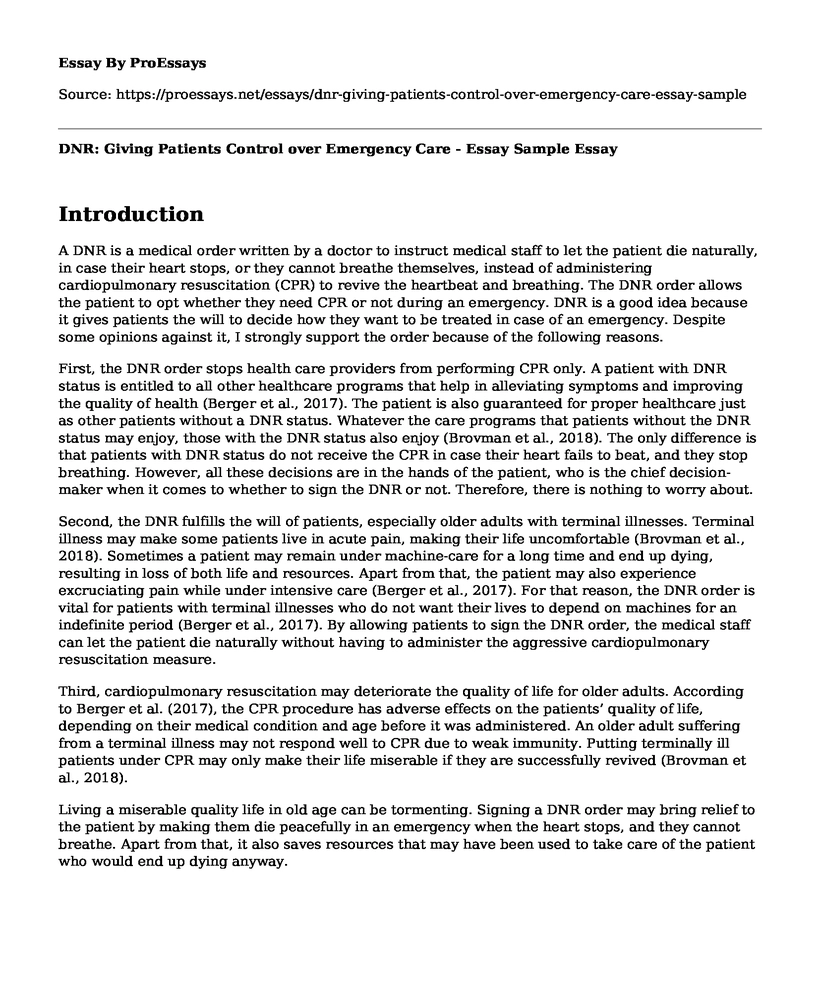Introduction
A DNR is a medical order written by a doctor to instruct medical staff to let the patient die naturally, in case their heart stops, or they cannot breathe themselves, instead of administering cardiopulmonary resuscitation (CPR) to revive the heartbeat and breathing. The DNR order allows the patient to opt whether they need CPR or not during an emergency. DNR is a good idea because it gives patients the will to decide how they want to be treated in case of an emergency. Despite some opinions against it, I strongly support the order because of the following reasons.
First, the DNR order stops health care providers from performing CPR only. A patient with DNR status is entitled to all other healthcare programs that help in alleviating symptoms and improving the quality of health (Berger et al., 2017). The patient is also guaranteed for proper healthcare just as other patients without a DNR status. Whatever the care programs that patients without the DNR status may enjoy, those with the DNR status also enjoy (Brovman et al., 2018). The only difference is that patients with DNR status do not receive the CPR in case their heart fails to beat, and they stop breathing. However, all these decisions are in the hands of the patient, who is the chief decision-maker when it comes to whether to sign the DNR or not. Therefore, there is nothing to worry about.
Second, the DNR fulfills the will of patients, especially older adults with terminal illnesses. Terminal illness may make some patients live in acute pain, making their life uncomfortable (Brovman et al., 2018). Sometimes a patient may remain under machine-care for a long time and end up dying, resulting in loss of both life and resources. Apart from that, the patient may also experience excruciating pain while under intensive care (Berger et al., 2017). For that reason, the DNR order is vital for patients with terminal illnesses who do not want their lives to depend on machines for an indefinite period (Berger et al., 2017). By allowing patients to sign the DNR order, the medical staff can let the patient die naturally without having to administer the aggressive cardiopulmonary resuscitation measure.
Third, cardiopulmonary resuscitation may deteriorate the quality of life for older adults. According to Berger et al. (2017), the CPR procedure has adverse effects on the patients’ quality of life, depending on their medical condition and age before it was administered. An older adult suffering from a terminal illness may not respond well to CPR due to weak immunity. Putting terminally ill patients under CPR may only make their life miserable if they are successfully revived (Brovman et al., 2018).
Living a miserable quality life in old age can be tormenting. Signing a DNR order may bring relief to the patient by making them die peacefully in an emergency when the heart stops, and they cannot breathe. Apart from that, it also saves resources that may have been used to take care of the patient who would end up dying anyway.
Conclusion
In conclusion, the DNR is a good idea that everyone should embrace to ensure people live a good quality of life only without having to add up miserable situations caused by cardiopulmonary resuscitation. The order fulfills the will of terminally ill patients who do not want to depend on machines to survive. The order guarantees all other treatment programs except cardiopulmonary resuscitation alone. Moreover, it helps to avoid the unnecessary living under miserable conditions of terminal illnesses.
References
Berger, J. M., Zelman, V., Muir H., Amaya, R., & Ershova, K. (2017). Clinical Ethics of the Do-Not-Resuscitate (DNR) Order and Other Advanced Directives in Anesthesia and ICU. Obsaâ Reanimatologiâ, 13(2), 61–74. https://doi-org.lopes.idm.oclc.org/10.15360/1813-9779-2017-2-61-74 Retrieved from https://lopes.idm.oclc.org/login?url=https://search.ebscohost.com/login.aspx?direct=true&db=edsdoj&AN=edsdoj.b1aac2ec03014ed38eecfe8609c42981&site=eds-live&scope=site
Brovman, E. Y., Walsh, E. C., Burton, B. N., Kuo, C. E., Lindvall, C., Gabriel, R. A., & Urman, R. D. (2018). Postoperative outcomes in patients with a do-not-resuscitate (DNR) order undergoing elective procedures. Journal of Clinical Anesthesia, 48, 81-88. doi:http://dx.doi.org.lopes.idm.oclc.org/10.1016/j.jclinane.2018.05.007 Retrieved from https://lopes.idm.oclc.org/login?url=https://search-proquest-com.lopes.idm.oclc.org/docview/2055561011?accountid=7374
Cite this page
DNR: Giving Patients Control over Emergency Care - Essay Sample. (2023, Aug 28). Retrieved from https://proessays.net/essays/dnr-giving-patients-control-over-emergency-care-essay-sample
If you are the original author of this essay and no longer wish to have it published on the ProEssays website, please click below to request its removal:
- Traditional Healthcare Insurance
- Paper Sample: Synthetic Marijuana and the Harm It Is Causing to Society
- Research Paper on Categories of Antimicrobial Agents
- Essay Sample on Advancement in Electronic Health Records - Feminist lens
- Heartland Hospital Patient-Centered Initiative Evaluation
- Essay Example on Health Care Systems: Ensuring Health Security for the Population
- Essay on Neisseria Meningitis: Deadly Pathogen-Host Interaction







